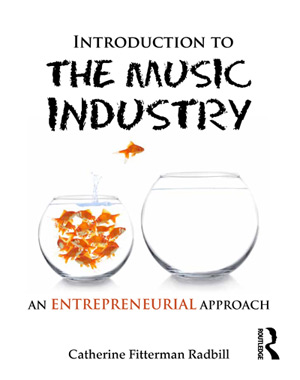 Introduction to the Music Industry: An Entrepreneurial Approach, by Radbill, Catherine Fitterman. New York: Routledge, 2013. ISBN: 978-0415896382
Introduction to the Music Industry: An Entrepreneurial Approach, by Radbill, Catherine Fitterman. New York: Routledge, 2013. ISBN: 978-0415896382
In her book entitled Introduction to the Music Industry: An Entrepreneurial Approach, Catherine Fitterman Radbill, Director of New York University Steinhardt School’s Undergraduate Music Business Program, presents the basics of working and surviving in the music industry. Written in a straightforward style, the text is divided into four main sections: “Thinking Like an Entrepreneur,” “Contacts and Contracts,” “Performing and Recording,” and “You as Entrepreneur.” Each section examines the basics of that topic, with chapters organized according to subtopic. While intended for use in an introductory undergraduate music business course, this volume could be of interest to music aficionados as well.
Written without excessive use of technical jargon, this text speaks to the music industry novice. Practical tips for structuring the early stages of one’s career, including advice regarding marketing, promotions, touring, recording, and copyrights are presented. Songwriters and composers in particular may be interested in Chapter 4 that explains copyright law as applied to the music industry. Chapter 11 regarding digital music services would also be of interest to performers. Other sections of the book may be ancillary to hands-on practice, and thus can be skimmed.
Links to websites and references appear throughout the text, prompting further research and study. Technical vocabulary is presented at the beginning of each chapter prior to engaging readers with the concepts. A companion website offers flash cards, videos, and web links for students (www.routledge.com/cw/radbill). Instructors may find assignment ideas, sample exams, and PowerPoint slides on the accompanying instructor site helpful in preparing lectures.
Radbill also offers points for class discussion or self-reflection in every chapter. Brief case studies, with names changed to protect identities, place concepts in context of a real-world situation. Additionally, two longer case studies provide impetus for reflection within a class session, organizational meeting, or internship. In one study, readers can pretend to advise the fictional band 3rd Rail on key concepts such as marketing, touring, branding, and audience cultivation. While the author provides suggested action plans, these would be most suitable for class discussion.
Entrepreneurship serves as the focal point for all topics, and Radbill postulates that musicians must effectively manage their careers. However, in order to find success, no amount of academic study is an adequate substitute for a combination of hard work, practical experiences, and self-reflection. Furthermore, the author argues that success is not guaranteed, nor does it occur overnight. In fact, several case studies ask the reader how a musician should proceed when it appears their career has stalled.
In the end, though, students or working professionals looking for a comprehensive guide are likely to be disappointed with this text. While informative, it lacks the depth or breadth necessary to illustrate the finer points of entrepreneurship. Similarly, it conspicuously avoids giving concrete advice, relying on the course instructor to fill in the gaps. Photos and illustrations often seem like filler material to take up space; in particular, the logo for 3rd Rail appears an inordinate number of times. While branding is necessary, viewing the logo multiple times on successive pages is excessive. In future editions, it is recommended that the use of illustrations be carefully considered, and an appendix of websites or works that delve into details on the topic be included.
In sum, this book serves best as an introductory text on music entrepreneurship for lower-level undergraduate students. Instructors should think carefully about the learning outcomes for their course, and select materials that would complement and enhance this text. For students with no prior knowledge of music entrepreneurship, this book could introduce them to the varied concepts they will encounter in more advanced coursework.


